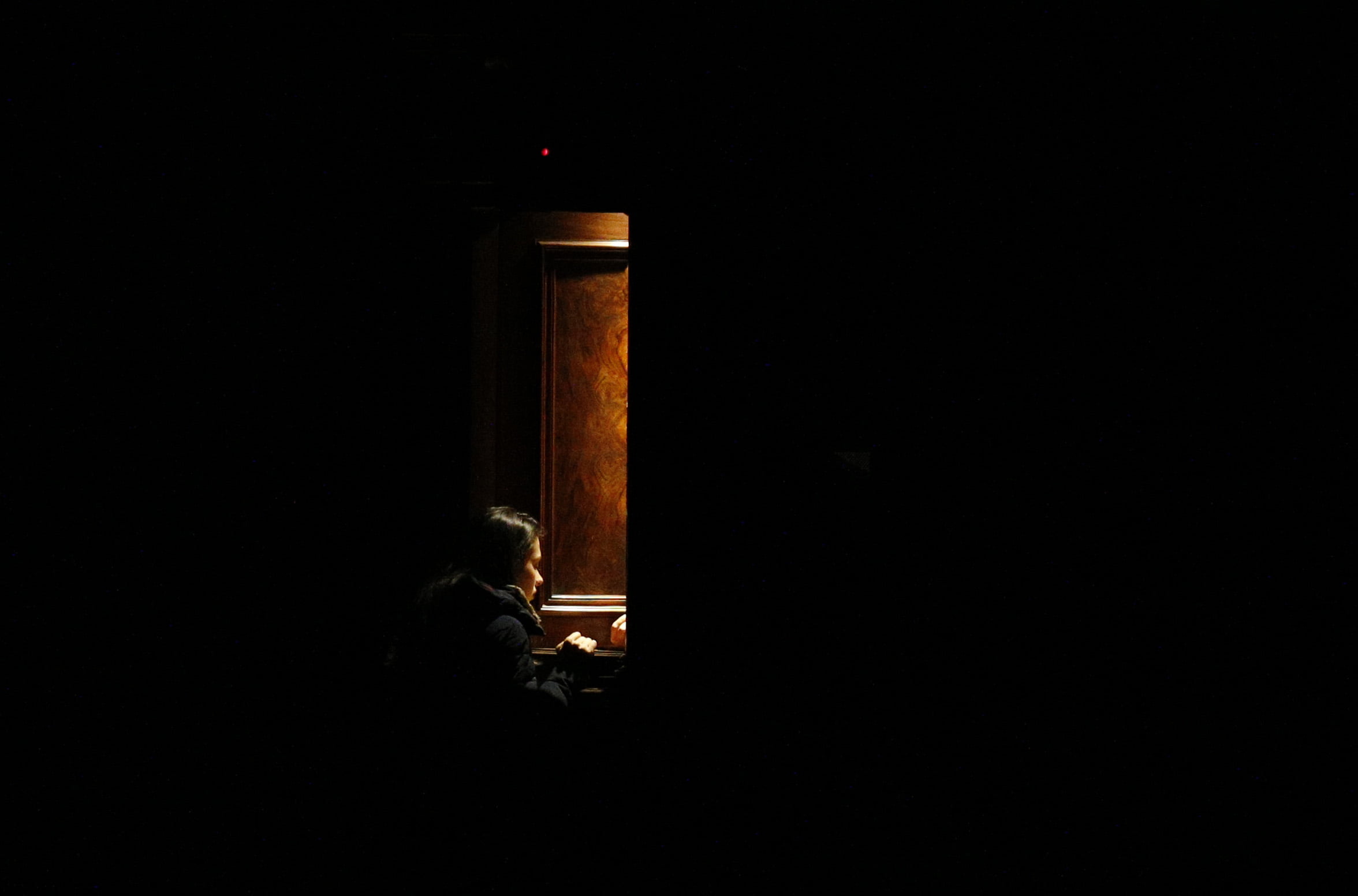
A woman goes to confession in darkness at the start of the Easter Vigil led by Pope Francis in St. Peter’s Basilica at the Vatican March 26. (CNS photo/Paul Haring)
by Joe Bollig
joe.bollig@theleaven.org
The late, Venerable Archbishop Fulton J. Sheen once told the following story about the sacrament of reconciliation.
There was a camp of rough Canadian lumberjacks in the deep woods. They hadn’t been to confession for quite some time, so they all decided to find a church in the nearest town.
They all lined up at the confessional — and sent the bravest one in first.
“Bless me, Father, for I have committed every sin a man could commit.”
“Well,” said the priest, “did you ever commit murder?”
“No, Father, that’s one sin I’ve never committed,” said the lumberjack.
“See, you haven’t examined your conscience thoroughly,” said the priest. “Go out and examine your conscience for a bit, and then come back.”
As the lumberjack stepped out of the confessional, he saw the long line of lumberjacks looking at him questioningly.
“It’s no use tonight, boys,” he said. “They’re just hearing murder cases.”
The point Archbishop Sheen was trying to make was that you have to prepare beforehand in order to make a good confession. So that got me thinking.
Making a good examination of conscience before going to confession — what’s that all about?
Receiving the sacraments in the Catholic Church is not like sticking a penny in the gumball machine and turning the crank. In order to celebrate any sacrament, you’ve got to be “well disposed.”
Being “well disposed” means “prepared.” You wouldn’t show up to run a marathon without training, would you? It’s the same thing with celebrating the sacrament of reconciliation.
You start out with contrition — sorrow for your sins. You ask God for forgiveness. You make an examination of conscience. And finally, you go to church to celebrate the sacrament of reconciliation.
What is an examination of conscience? According to the Catholic Catechism, it’s a “prayerful self-reflection of our words and deeds in light of the Gospel to determine how we may have sinned against God.”
Why is it necessary to examine our consciences? Here are four reasons.
First, folks like to give themselves a pass, and the good ol’ EOC is a reality check. It helps us get honest with ourselves and with God about how we’ve offended him and hurt others.
Second, the EOC helps us to understand our shortcomings and failures so we don’t do them again, and it helps us remember.
Third, an EOC helps us to confess more completely and receive the full benefit of the sacrament.
Fourth, an EOC helps the priest minister to the penitent.
OK, so we have “what” and “why.” Here comes the “how.”
There is more than one way to make an examination of conscience. One form might work better for you than another. Or, you might want to use more than one form.
Here are some tips and places to go:
Choose one appropriate to your age and situation. It makes no sense for an adult to use an EOC for a child, and vice versa. The United States Conference of Catholic Bishops offers downloadable EOCs for married persons, singles, young adults and children.
Choose one from the Scriptures. For centuries, men and women have made an EOC by going to the Bible and using the Ten Commandments (Ex 20:1-17) or by meditating on the Beatitudes in the Sermon on the Mount (Mt 5:1-12), or by meditating on the penitential psalms, especially Psalm 51.
Choose one according to Catholic Social Teaching. Again, this can be found at the USCCB link above.
Choose one guided by the Catholic Catechism. Ask yourself if you’ve committed any mortal sins. Here’s the three-part test: 1. Full knowledge (You know it’s wrong). 2. Full consent (Knowing it is wrong, you do it anyway). 3. Serious or grave matter (See the Ten Commandments). Also, ask yourself if you’ve committed any of the Seven Deadly/Grave Sins: pride, sloth, greed, envy, wrath, lust or gluttony.
Choose one from a Catholic diocese, religious order or apostolate. There are many forms offered out there, so you’ll have to exercise a bit of caution and discernment.
Father Larry Richards, a pastor from the Diocese of Erie, is a nationally famous speaker about the sacrament of reconciliation. He gave an excellent talk available here.
Father Richards also has a 22-point list called “The Questions.” A free CD by Father Richards containing “The Questions” can be found here.
Finally, don’t forget to ask the Holy Spirit to help you. Here is a traditional prayer to make before celebrating the sacrament of reconciliation:
Come Holy Spirit into my soul. Enlighten my mind that I may know the sins I ought to confess, and grant me your grace to confess them fully, humbly and with a contrite heart. Help me to firmly resolve not to commit them again. O Blessed Virgin, Mother of my Redeemer, mirror of innocence and sanctity, and refuge of penitent sinners, intercede for me through the Passion of Your Son, that I may obtain the grace to make a good confession. All you blessed Angels and Saints of God, pray for me, a most miserable sinner, that I may repent from my evil ways, that my heart may henceforth be forever united with yours in eternal love. Amen.






